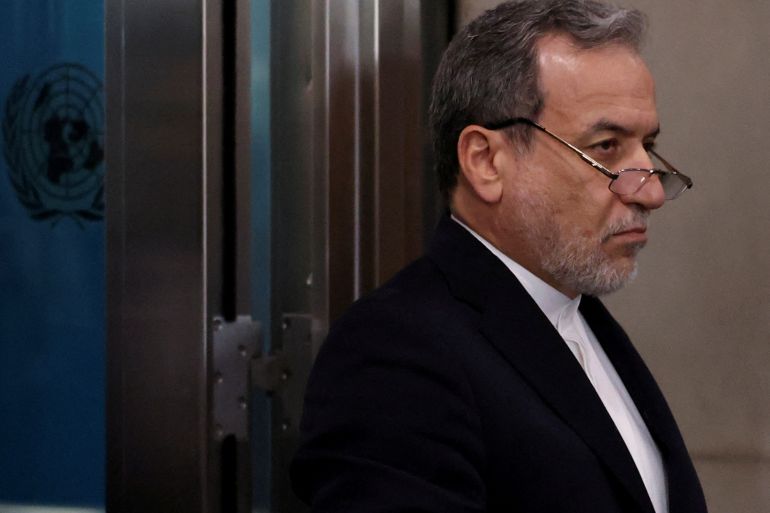Iranian FM pledges ‘stronger’ retaliation if Israel strikes Iran
In Beirut, Abbas Araghchi says Tehran supports an Israel-Lebanon ceasefire, contingent on a simultaneous truce in Gaza.
Abbas Araghchi’s visit to Beirut comes days after Iran launched at least missiles into Israel [Caitlin Ochs/Reuters]Published On 4 Oct 20244 Oct 2024
Iran’s foreign minister says he supports efforts for a regional ceasefire with Israel, while also warning Tel Aviv that if it carries out an attack on Iran, Tehran will retaliate in a harsh way.
Abbas Araghchi’s remarks on Friday came as he was in Beirut for meetings with Lebanese officials. His visit took place three days after the latest in a series of rapidly escalating attacks that threaten to push the region closer to an all-out war.
“If the Israeli entity takes any step or measure against us, our retaliation will be stronger than the previous one,” Araghchi said after meeting Lebanon’s Parliament Speaker Nabih Berri.
On Tuesday, Iran launched missiles at Israel. Iran said the attack was in retaliation for Israel’s killings of senior Hezbollah, Hamas and Iranian Islamic Revolutionary Guard Corps (IRGC) figures, including Hezbollah leader Hassan Nasrallah, and escalating attacks in Lebanon.
Araghchi said his presence in the city under bombardment signals Iran’s support for Hezbollah and expressed backing for a ceasefire in Lebanon, contingent on a simultaneous Israeli ceasefire in Gaza.
“We support the efforts for a ceasefire, provided that first, the rights of the Lebanese people are respected and it is accepted by the [Hezbollah] resistance, and second, that it comes simultaneously with a ceasefire in Gaza,” he said.
Araghchi said Iran’s strikes on Israel were “legitimate self-defence based on the UN Charter”.
“Unlike Israel, which targets residential areas, we only attacked military centres,” he said. “We do not intend to continue the attacks unless the Zionist regime chooses to continue its attacks.”
Israeli strikes on Lebanon, especially in the capital’s densely populated southern suburbs, continued on Friday. A day earlier, Israeli forces pounded the area, with residents describing the explosions as the most violent attack so far on Beirut.
At least 11 consecutive raids reportedly shook the ground and sent plumes of smoke into the skyline late on Thursday.
Israel’s army said the attack in Beirut had killed Mohammad Rashid Sakafi, Hezbollah’s head of communications. There has been no confirmation from Hezbollah.
Israel has carried out deadly air raids in Beirut and across the country for nearly two weeks, killing more than 1,900 people, according to Lebanon’s Ministry of Public Health, and forcing hundreds of thousands to flee their homes.
‘More surprises’?
Israel has also cut off the main border crossing between Lebanon and Syria for people fleeing Israeli bombardment, including vulnerable Syrian refugees.
Israel claimed it had targeted the crossing because it was allegedly being used by Hezbollah to transport military equipment across the border.
Meanwhile, Israeli ground troops have been battling Hezbollah fighters in the south ever since they entered Lebanese territory on Tuesday. Israel has said 250 Hezbollah fighters have been killed in south Lebanon so far.
While there has been no confirmation from Hezbollah, the Lebanese group has also been claiming attacks and causing casualties among Israeli soldiers.
In the Iranian capital, Tehran, the country’s Supreme Leader Ayatollah Ali Khamenei led Friday prayers and delivered a speech in which he praised the country’s recent missile strike on Israel and said Iran was prepared to conduct more strikes if needed.
Ali Fadavi, the deputy commander of Iran’s Islamic Revolutionary Guard Corps (IRGC), echoed the sentiments, and warned that Iran would target all of Israel’s “energy sources, stations … refineries and gas fields”.
“Israel has three power plants and several refineries, and we can attack them at the same time,” Fadavi was quoted by Iran’s semi-official Mehr news agency as saying on Friday.
A day earlier, Iran sent Israel’s close ally, the United States, an indirect message via Qatar, saying that any Israeli attack against Iran would meet an “unconventional response” that includes targeting Israeli infrastructure.
Israeli officials including Prime Minister Benjamin Netanyahu have pledged to respond to Iran’s two-wave missile attack.
Israel’s Defence Minister Yoav Gallant said the army had “more surprises in our arsenal,” according to Israeli media reports. He said that the military operation in Lebanon will continue “until the removal of combat means”.
The new wave of strikes came after Israel ordered people to evacuate towns and villages in southern Lebanon, including but also beyond an area that the United Nations declared a buffer zone after Israel and Hezbollah fought a monthlong war in 2006.
